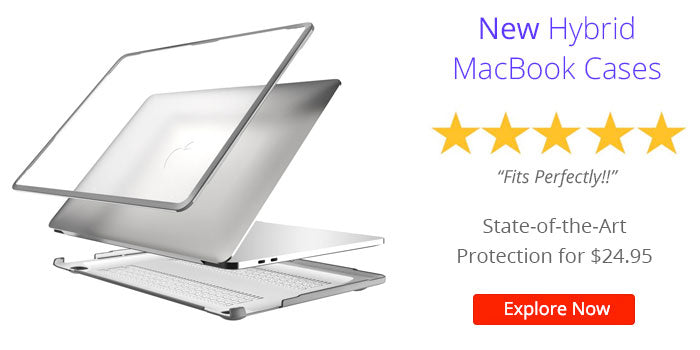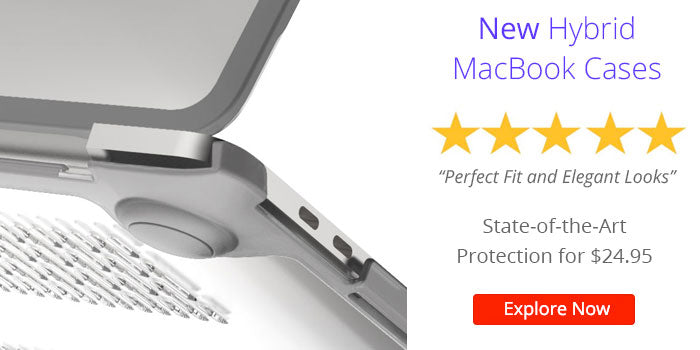How Do I Keep My MacBook Air Healthy?
Updated - November, 2025
Your MacBook Air is a sleek and powerful companion, but like any electronic device, it requires care and attention to ensure it stays healthy and performs optimally throughout its lifespan.
From software management to physical care via a MacBook Air case and mindful usage, here's a comprehensive guide on how to keep your MacBook Air in top condition.
MacBook Air Health - Top 10 Tips
Keeping your MacBook Air healthy is easy by following thees simple, top 10 common-sense tips:
1. Software Management
Regularly updating your MacBook Air's operating system and applications is essential. Updates often include bug fixes, security patches, and performance improvements. While Macs are generally less susceptible to viruses than other platforms, it's wise to have antivirus software installed to add an extra layer of protection.
2. Physical Care
Consider investing in a good-quality MacBook hardshell case, MacBook cover, leather MacBook case or sleeve to protect your MacBook from scratches and minor impacts. A keyboard cover can also prevent spills and debris from entering the keyboard.
Dust can accumulate in the vents, affecting your MacBook's cooling system. Use compressed air to blow out dust from the keyboard and ports. Wipe your MacBook's screen and body regularly with a microfiber cloth. Be cautious with liquids and avoid spraying directly on the device.
Watch How This Case Protects Your MacBook Air
3. Data Backup
Set up Time Machine or another backup solution to regularly back up your data. This ensures that if anything goes wrong, you can restore your MacBook to a previous state.
4. Battery Management
Calibrate your MacBook Air's battery occasionally by letting it drain completely, then charging it to 100%. This helps ensure your battery meter is accurate. Try not to keep your MacBook Air plugged in all the time. Let the battery go through charge cycles to maintain its health.
5. Startup Optimization
Review and minimize the number of applications that launch at startup. This not only speeds up your MacBook's boot time but also conserves resources for essential tasks. Quit unused apps to free up resources and prevent battery drain.
6. Performance Optimization
The Activity Monitor tool helps identify and close resource-intensive applications. Check for background processes and close unnecessary apps to free up system resources.
7. Storage Optimization
MacBook Airs often come with limited storage. Periodically review your files and delete anything you no longer need. Take advantage of macOS's built-in tools like "Optimize Storage."
This feature helps you remove clutter, including old email attachments and system files that can be safely deleted. If your MacBook Air is running out of space, consider offloading large files to external drives or cloud storage services.
8. Security Measures
Enable FileVault for disk encryption to secure your data. This ensures that even if your MacBook is stolen, your information remains protected. Set up a strong login password, and if your MacBook supports it, enable Touch ID or Face ID for added security.
9. Mindful Usage
Avoid eating and drinking near your MacBook. Accidents happen, and liquid spills can cause serious damage. When using your MacBook, place it on a stable, flat surface.
This ensures proper ventilation and prevents overheating. Don't expose your Air to extreme temperatures or humidity. Keep your MacBook in a cool, dry environment. Extreme temperatures can affect battery performance.
Give your Air a break! Don't leave it running for extended periods without taking breaks. Let it sleep or shut down to prevent overheating and conserve battery life.
10. Regular Checkups
Periodically review your MacBook's overall health. Check for any unusual noises, monitor battery performance, and address issues promptly. Review the exterior body and check for dents, scratches or other damage.
MacBook Air Health
A great place to start in keeping your MacBook Air healthy is with the top 10 tips above. A MacBook Air is an investment in yourself and in your work. Proper care protects this valuable investment.
By preventing scratches, overheating, and software issues, you keep your Air looking and working like new for years, saving you the cost of repairs or replacements."
If you're having persistent issues or notice a significant decline in performance, it might be time to call in the professionals. Seek help from Apple Support or visit an Apple Authorized Service Provider.
A healthy MacBook Air doesn't just look good, it sings! Keeping it in top shape extends its life, saves you money, and boosts your productivity. Think of it this way: a dusty, sluggish Air frustrates with slowdowns and crashes, potentially losing precious work.
MacBook Health - Why Maintenance Matters
A neglected battery might conk out in the middle of an important presentation. On the other hand, a clean, optimized Air purrs with responsiveness, letting you unleash your creativity and get things done without hiccups.
The health and longevity of your MacBook Air depend on a combination of proactive software management, physical care, and mindful usage. Regular updates, storage optimization, battery management, and security measures all contribute to keeping your MacBook Air healthy.
By incorporating these practices into your MacBook routine, you not only ensure optimal performance but also extend the life of your device. Treat your MacBook Air with the care it deserves, and it will continue to be your reliable companion for years to come.
About Michael Santoro
Michael Santoro is a multi-award-winning designer across a broad range of industries including automotive, product and aerospace. In 1998 he founded MacCase and with it, the Apple-specific case market with his design for a case for the original iBook. He is also dedicated to mentoring new creative talent through his tutoring programs at Art College Prep and How to Draw Cars. Learn more about his work at Michael Santoro Design.
Additional Reading -
• What Case Fits the New MacBook Air?





